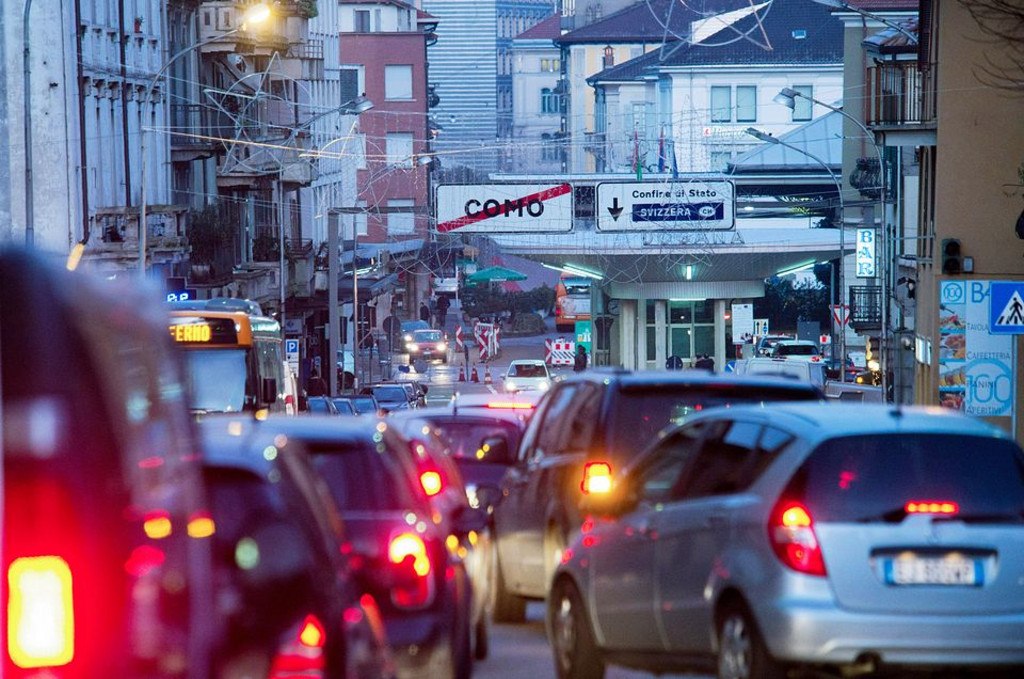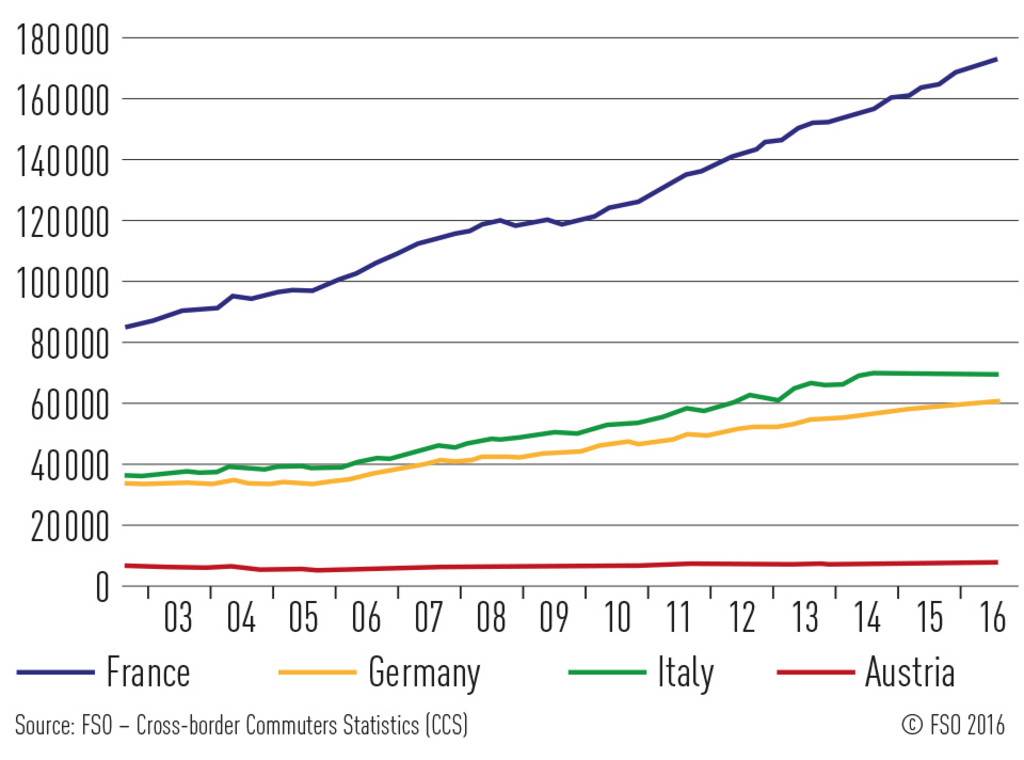Cross-border commuters prefer to travel to work by car. This explains the endless flow of vehicles which pour into Ticino every morning from the Italian border regions of Como and Varese and back again in the opposite direction in the evening. At the Chiasso border crossing, the “Frontalieri” even have their own lane at rush hour. Canton Ticino, with a population of 350,000, now has around 62,500 cross-border commuters. The figure has risen sharply in just a few years. Even more significant than the absolute number is the fact that over a quarter of all jobs are held by border crossers. No other major Swiss region has a comparably high proportion. Another important factor is that the cross-border workers in Ticino – unlike in the 1990s – no longer exclusively work in the industrial sector but are instead increasingly active in the services sector.
A row has been raging for years over whether the incomers are taking jobs from local people and contributing to social dumping because they are willing to work for lower pay than Swiss workers. The border between Switzerland and Italy actually also represents a divide in terms of salary. Pay is at least two or three times higher in Switzerland than in Italy. Even on low Swiss wages, Italian commuters earn much more than they would in their own country. Studies have shown that no other border in central Europe has such a great wage gap. On top of this, lots of Italians are willing to undertake long journeys owing to the prolonged economic crisis and high rate of unemployment in Italy. Their main concern is finding a job. Conversely, there is a lack of specialists in Ticino. Many positions cannot be filled with Swiss employees.
Locals have not been ousted
A study by the economic research institute of the Università della Svizzera italiana (University of Italian-speaking Switzerland) concluded in 2016 that “the increase in the number of cross-border commuters and resident foreign nationals as a result of the agreement on the free movement of persons has not increased the risk of unemployment for the local Swiss population in Ticino”. While isolated cases of Swiss employees being replaced by foreign workers could not be ruled out, there was no evidence of systematic displacement. The unemployment rate remains low at around 3.5 % and is in line with the Swiss average.
However, many people in Ticino feel that their jobs are under threat because the pressure has increased. They are also worried about their salaries. They are fed up too with the daily gridlock in the border areas. The referendum result on 9 February 2014 reflected this sensitivity: 68 % of Ticino’s electorate voted in favour of the federal popular initiative “against mass immigration” launched by the nationalist, conservative SVP party. It was the highest proportion of yes votes out of all the cantons. In contrast to German-speaking Switzerland, where the main factor in the referendum result was immigration itself, in Ticino the phenomenon of cross-border commuters played a key role in the demand for the reintroduction of quotas for foreign workers.
In light of the outcome, the Ticino SVP immediately replicated the proposal with a cantonal initiative under the slogan “Prima i nostri!” (Our own people first!). This bill called for priority for Swiss people on the employment market to be incorporated in the cantonal constitution. The number of signatures required was quickly collected and at the end of September 2016, 58 % of voters in the Italian-speaking canton of Ticino approved this constitutional initiative.
Combatting social dumping through priority for Swiss citizens
The cantonal constitution now stipulates that priority must be given to Swiss citizens if they hold similar qualifications. Giving priority to Swiss workers aims to prevent social dumping. Canton Ticino has also been assigned the task of “monitoring international treaties agreed by the Swiss Confederation”. This refers, for example, to the tax agreement on cross-border commuters between Switzerland and Italy.
Appeals by the cantonal government and the parliamentary majority to reject the SVP initiative because it would introduce provisions on social, economic and foreign policy which do not fall under the canton’s remit fell on deaf ears. An expert opinion commissioned from Giovanni Baggini, professor of constitutional, administrative and European law at the University of Zurich, came to the conclusion that the initiative would be almost impossible to implement. A special parliamentary committee is now working on drawing up proposals for those areas where implementing priority for Swiss citizens appears possible, such as in the public administration. In the same way as with the implementation of the mass immigration initiative at national level, which the Swiss Parliament is having a tough time with, the Ticino laws must be compatible with the bilateral agreements with the EU and the free movement of persons.
Tensions running high in the border region
In Italy, an EU state, there is annoyance over the general efforts to reintroduce priority for Swiss nationals in Switzerland. The adoption of the “Prima i nostri!” popular initiative has not exactly eased existing tensions between Ticino and the Italian border regions. This is because the referendum result has obviously been perceived in Italy as a vote against cross-border commuters. The referendum result even made front-page news in the leading daily newspaper “Corriere della Sera”. The idea of a strike by cross-border workers was also briefly discussed.
Various Italian politicians have indicated that the economic boom in Ticino after the entry into force of the bilateral agreements and the resultant opening of the market is partly attributable to the cross-border commuters. Italian workers are also vital to ensuring that public institutions, such as homes for the elderly and hospitals, can run properly. These factors are nevertheless not recognised. “Workers from Lombardy cannot be humiliated on a daily basis and treated like illegal residents,” complained Roberto Maroni of the Lega-Nord, who is President of the Lombardy region, at first. But after the initial strong response to the approval of the popular initiative the tone has since been moderated. After a meeting with Ticino’s cantonal government in Bellinzona, Maroni declared that, “cooperation between the border regions would remain constructive”.
Previously, only canton Geneva had a protective cantonal clause for the employment market. However, the provision in force there since 2012 only applies to the cantonal administration, institutions of public law and publicly co-financed foundations. Before a position is publicly advertised and filled, it is mandatory for the regional employment agencies to check whether a person residing in the canton can be found for the job.
Gerhard Lob is a freelance journalist in Ticino
Foreign cross-border commuters by country of residence
In 2001 – i.e. before the entry into force of the free movement of persons with the western EU states – the Federal Statistical Office (FSO) recorded 151,133 cross-border commuters in Switzerland. There are now 314,110 (as at: 3rd quarter 2016). Most of them come from France and primarily work in the Lake Geneva region. No other major Swiss region employs more cross-border workers. In second place comes northwestern Switzerland with the border city of Basel. In all, 72,556 cross-border commuters work there and predominantly come from Germany but also from France. Most Italian border crossers commute to canton Ticino but others travel to Grisons or Valais. In terms of the total number of commuters employed, little Ticino comes in third place behind the arc of Lake Geneva and northwestern Switzerland. Cross-border commuters make up just 10 % of all those in gainful employment in the Lake Geneva region while their proportion stands at a similar level in northwestern Switzerland. The proportion is highest by some margin in Ticino where 26.2 % of the workforce are border crossers.
Cross-border commuters
Cross-border commuters are foreign nationals who live in the foreign border zone but work in the neighbouring Swiss border zone. Border zones are regions determined in the agreements on cross-border commuters concluded between Switzerland and its neighbouring countries. The border crossers must return to their main place of residence abroad at least once a week.
Cross-border commuters from the EU/EFTA member states are granted occupational and geographical mobility within all of Switzerland’s border zones. No border zones have applied for citizens of the EU-17 states and EFTA since 1 June 2007. They can live anywhere in the EU/EFTA and work anywhere in Switzerland. The only condition is that they return to their place of residence abroad once a week. The border zones continue to apply for citizens of the EU-8 and EU-2 states (Bulgaria and Romania).





![[Translate to en:]](/fileadmin/_processed_/d/2/csm_Revue_202204_Huehnerfarm_SH-Reportage_3074_7901ca94df.jpg)





Comments
Comments :
Par contre, je m'associe à votre remarque sur le "petit canton". Ce n'est pas parce qu'on est une minorité linguistique que notre canton rétrécit! Perception faussée mais intéressante sur la façon de voir le Tessin par ses compatriotes?
Mit 52 wurde ich entlassen mit der Begründung, dass es einfacher sei, in der CH jemandem zu kündigen als in D oder A, da dort Kündigungsschutz und Gewerkschaften die Arbeitnehmer viel besser schützen. Zudem sei ich zu teuer. Mein Nachfolger aus A hat dann für weniger als 3000 Euro gearbeitet.
Eine neue Anstellung hat sich nicht mehr ergeben. Lauter Absagen mit "zu teuer" und "überqualifiziert" musste ich hinnehmen.
Zum Glück konnte ich es mir leisten nun nach Thailand auszuwandern.
Die heutige Wischi-Waschi-Politik aus Bern wird die CH leider nicht weiter bringen. In der jetzigen Zusammensetzung des Parlamentes scheint eine Politik in die eine oder andere Richtung nicht möglich zu sein, dafür wird die CH mittel- bis langfristig büssen müssen, leider.
Furthermore, Lugano is congested by traffic and there is no tube. The air and noise pollution between Paradiso and Parco Ciani is unbearable. It takes an hour from point A to point B in the morning/evening, but less than 2 minutes at night!!
Und Herr Schwab, seien Sie ehrlich, das Eine hat mit dem Anderen nichts zu tun.
Haben Sie meinen besten Dank und Respekt für Ihre sdachliche Richtigstellung.
mfG Erwin Balli
I am an expat too and am grateful that I am welcome here and my work is valued here. It amazes me that other expats in similar positions are unwilling to expand the same welcome to foreigners into our homeland: Switzerland.
Age discrimination is a real problem. So is traffic. We should work on solutions for those and not confuse them with "other" people coming to work in Switzerland.